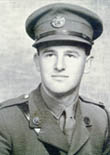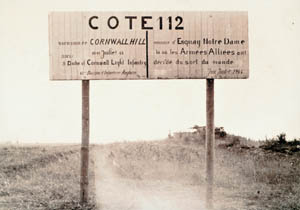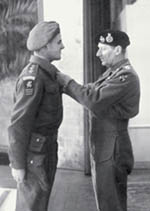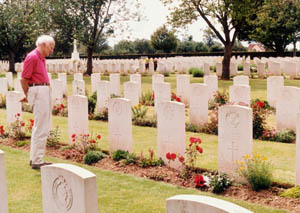 Return to Normandy Return to Normandy
D-Day Beaches, Normandy
by Sarah Shuckburgh
Sir David Willcocks shows his
daughter, Sarah Shuckburgh, the hillside where, 60 years
ago, he fought in the fiercest battle of the D-Day
campaign.
Behind a mossy stone wall, cider apples ripen in a small
orchard. A dusty cart track disappears between fields of
rustling, waist-high corn towards a distant hamlet. Larks
sing in a cloudless sky. It is almost impossible to imagine
the battle fought here nearly 60 years ago, a few days after
D-Day, that would be remembered as the fiercest and most
costly of the Normandy campaign.
My father, (now Sir) David Willcocks, was there as a
24-year-old intelligence officer (43rd Wessex, 214 Brigade,
Duke of Cornwall's Light Infantry), but until now I have
never heard him talk about Hill 112, nor of the events that
led to his winning the Military Cross.
Just once, on a summer's day in 1964, as we drove through
Normandy on our way to a family holiday, did he broach the
subject, when he suggested a walk on the hill where he had
fought 20 years before. I was 13. The outing sounded boring,
and I refused to get out of the car. The rest of the family
set off and were gone for an age. When they got back, I was
shocked to see tears in my father's eyes. My sister and
brothers were subdued, and I knew I had missed something
important. I have often thought about that day, and wondered
what I might have learnt about my father had I not been
sulking.
Forty years on, reading about other veterans' plans to visit
battlefields, I suggest that we return to Normandy.
At first my father is reluctant. Since the war, he has
devoted his life to music, as choirmaster, conductor,
composer and director of the Royal College of Music. His
recordings include many with the choir of King's College,
Cambridge, where he was Director of Music for 16 years, and
with The Bach Choir, which he conducted for 38 years. He
still tours the world as a choral conductor and, at 84, his
extraordinary stamina is undiminished. He is not someone who
looks back.
He tells me Normandy will have changed completely. He won't
remember anything. I wouldn't find it interesting. And
anyway his schedule of concerts means that he has no free
time for months. But at last he agrees, and our expedition
is inked into his diary.
And now here we are, my father and mother, my sister and I,
checking into a quiet hotel in the Bocage, a region of
Calvados with sunken lanes and thick hedges, just inland
from Arromanches-les-Bains. Later, we walk along the cliff
towards Gold Beach, where my father's battalion landed on
June 22, 1944, when the sea was so rough that the soldiers
had to jump into chest-deep water and wade ashore, carrying
weapons - and bicycles - over their heads. Precious items,
such as photographs, were stowed under helmets. My father
was one of over two million men to land in Normandy that
summer.
"By the time we arrived, the beach had been made safe, with
mines cleared from a marked area of sand. We followed signs
saying "43rd Wessex This Way", past deserted concrete
pillboxes and over the sand dunes to an assembly point in a
trampled cornfield. What I remember above all is the stench
of rotting cattle and gunpowder. Most of the dead soldiers
had been buried, but there were dead animals everywhere."
My father is by nature cheerful, but next morning, I see an
unfamiliar, introspective side of his character. In the
medieval centre of Bayeux, weighty volumes catalogue the
name, rank and burial place of thousands of soldiers killed
here in 1944. My father, ashen-faced, searches the grim
pages. "So many of my friends died," he murmurs.
We drive first to the war cemetery on the outskirts of
Bayeux. Here, heart-breaking ranks of headstones gleam in
the sunshine. Roses, lavender and other colourful flowers
bloom over each grave. The grass seems impossibly green
and trim, the stone an ethereal white. Among many
stone-carved Wessex wyverns and Cornish coronets lies the
grave of Lt-Col Atherton. My father stands, sombre and
drawn, silently remembering, as bees buzz eagerly among
the flowers at his feet.
"Jack Atherton was my CO, and as his intelligence officer, I
knew him very well. He was a wonderful man. He was killed on
the first day of action." Nearby lies Major Perceval Coode.
"He died the day after Atherton. He was popular with
everyone, and a great friend of mine. At the time, you just
say `Oh dear, old Perceval's caught it.' There's no time for
emotion.
"I'd never seen a dead body before I arrived in Normandy,
but here corpses were lying everywhere you looked. When we
could, we'd dig a grave and mark the spot with a wooden
cross. You'd make a mental note to write to the widow when
you got a chance."
The next cemetery, in fields near the hamlet of St Manvieu,
is smaller and even more poignant. In the corner of its
hauntingly beautiful garden, my father finds the grave of
Captain Basil Aimers.
 "I'd served with Basil since I joined the battalion in 1941.
He was an Irishman, a lovely chap, always cheerful. We
played a lot of bridge together. He often talked about his
girlfriend, Rosemary, and after he was killed, she wrote to
his mother regularly until his mother's death many years
later. I know Rosemary still thinks about him." "I'd served with Basil since I joined the battalion in 1941.
He was an Irishman, a lovely chap, always cheerful. We
played a lot of bridge together. He often talked about his
girlfriend, Rosemary, and after he was killed, she wrote to
his mother regularly until his mother's death many years
later. I know Rosemary still thinks about him."
At Banneville-la-Campagne are another 2,000 graves,
including that of my father's second CO, Lt-Col James. In a
small chapel, my father signs the Book of Remembrance and I
feel a lump in my throat as I read the other inscriptions.
"I found you at last, Dad," writes one visitor. "Never
forgotten, my dearest husband," writes another. "I took 60
years to come, but here I am, brother," says one, from
Australia.
The next day, unfolding yellowing War Office maps retrieved
from my parents' attic, we drive between hedgerows strewn
with wild flowers, and past sunny pastures where black and
white cows graze peacefully, to the village where my father
first saw action.
"We started the advance towards Cheux at two in the morning,
in pouring rain," he tells us. "The roads and fields were
sodden and muddy, and we finally jettisoned the useless
bicycles we'd carried ashore at Arromanches and lugged all
the way from the coast. Everything was chaotic. Our
anti-tank guns and other vehicles got held up in the narrow
sunken lanes, and we arrived in Cheux without them. The
troops we were meant to replace had withdrawn too soon -
before we got there - so the village was back in German
hands. It was my first experience of the confusion of real
war."
As Intelligence Officer, my father had to report to the CO
on all four companies in the battalion. "I was visiting the
orchard where one of our companies was based, when I heard
some tanks rumbling towards me," remembers my father. "I
realised they were too big to be British. I jumped into a
shallow ditch with another officer, Hugh Jobson, and we
waited as six Panther tanks thundered down. One halted right
above our heads - the giant caterpillar tracks were either
side of us, not two feet away. German tanks were bigger and
more resilient than our Sherman tanks. Shells just bounced
off them like ping-pong balls. After what seemed like an
age, the tanks rolled on towards battalion headquarters."
What followed on that day made the 5th DCLI famous along the
entire front - in their first half hour of action, with only
20 killed or wounded, the battalion destroyed five Panther
tanks. To knock out one was a considerable achievement. To
get five, manned by SS troops, was extraordinary. But among
the dead in those first 24 hours were Atherton and Coode,
the friends whose graves we had visited that morning.
Having regained and held Cheux for three days, 214 Brigade's
next task was to push on to Colleville, a strategically
placed hamlet a mile to the south. The countryside here is
gently undulating, but the thick hedgerows and deeply rutted
lanes hampered the movement of tanks and artillery. Ripening
cornfields provided cover for snipers, and the walled farms
and compact villages of Calvados favoured defence. The
infantry divisions inched forward, bitterly contesting each
field and hedgerow.
"Operation Jupiter was planned by Montgomery to draw German
forces towards Caen, and allow American troops to break out
to the south and then swing eastwards with less resistance,"
my father explains. "More and more German forces were being
brought in, and by this time we were facing seven Panzer
divisions. We were in the Colleville area for three days,
under constant bombardment."
 The battalion's next orders were to occupy Fontaine
Etoupefour, a village near the River Odon. "I'll never
forget the terrifying walk down the railway line," my father
says. "We took all night to get there, in pitch darkness,
stepping over fallen telegraph poles, tangled cables and
twisted rails, and stumbling into craters, with shells
exploding all around. You didn't know where the next one
would fall." The battalion's next orders were to occupy Fontaine
Etoupefour, a village near the River Odon. "I'll never
forget the terrifying walk down the railway line," my father
says. "We took all night to get there, in pitch darkness,
stepping over fallen telegraph poles, tangled cables and
twisted rails, and stumbling into craters, with shells
exploding all around. You didn't know where the next one
would fall."
We look at the army map. "It's only three miles," exclaims
my father in surprise. "But it felt like 20. It was
incredibly frightening. We crossed the Odon, and crept on as
far as Fontaine Etoupefour by moonlight. We dug slits, and
spent the next day hiding there, behind enemy lines, with
German patrols walking past a few feet away. Then we got an
order to go back to Colleville, so we faced the terrifying
railway walk again. That was where my friend Basil Aimers
was killed."
The Odon, so hard to cross with artillery and tanks, is now
a tiny trickle, but with steep, densely thicketed sides.
More men died crossing this stream in July 1944 than
crossing the Rhine. Throughout these advances, the goal was
the ridge of land between the rivers Odon and Orne. Now we
drive there and park near a memorial to the 43rd Wessex
Division. This time, unlike that summer's day when I was 13,
I get out of the car.
Hill 112 - its height in metres above sea level - is
nondescript as a topographical feature. But in July 1944,
this windswept mound was of enormous tactical importance,
with its wide views in every direction, especially towards
Carpiquet airfield and heavily fortified Caen. Field Marshal
Rommel declared: "He who controls Hill 112, controls
Normandy." One of Operation Jupiter's goals was to take the
hill at any cost.
The attack began before dawn on July 10. Unshaven and
exhausted after two sleepless nights, my father and his
colleagues watched the battle's early stages from Fontaine
Etoupefour. My father was with his Commanding Officer when
Brigadier Essame ordered the 5th Battalion DCLI to join the
attack.
"It was immediately obvious that this was to be a tough
assignment," says my father. "The Brigadier made no
attempt to disguise the danger." Despite Allied air
supremacy, the plan was to use infantry and artillery rather
than
air bombardment. At 8.30pm, the 5th DCLI started to advance,
under smoke, towards enemy tanks that were dug in
on the crest.
"Our own tanks hadn't arrived in time, and the infantry were
very vulnerable. Within minutes, machine-gun fire had killed
nearly all of B Company. Mortar bombs and shells were
exploding all around us. We found we couldn't dig proper
ditches through the tangled tree roots. When it got dark,
the situation became even more confused. We lost touch with
C Company for several hours. We were completely outnumbered,
and the German attacks were relentless and overwhelming. We
had to fight at close quarters, hand to hand. Everywhere,
men were lying wounded or dying. It was a terrifying night."
The fighting continued all night and through the next day.
For his conduct, my father was awarded the Military Cross,
but, with typical reticence, all he will say today is that
he was far less deserving than others in his battalion.
During the chaos, an unauthorised order to withdraw -
possibly of enemy origin - lost the battalion hard-earned
ground. Communication lines had been cut, and the soldiers
were exhausted, having not slept for three nights. By 3pm,
only one senior officer - a major - was still alive. He made
the difficult decision - risking a court martial - to
withdraw without orders, before the rest of the battalion
was annihilated.
"I lost many friends on Hill 112," my father says quietly.
"We had been training together for four years, but none of
us ever anticipated such heavy casualties." He stands
silently, his face sombre, but his bearing still upright.
All around stretches a tranquil landscape, dotted with farms
and orchards.
 Hill 112 was never captured - the Germans held it until they
retreated in early August. Later, when my father's battalion
returned to the hill, they found bodies heaped around
partly-dug trenches, scattered across cornfields, and
clogging the River Odon. Hill 112 was never captured - the Germans held it until they
retreated in early August. Later, when my father's battalion
returned to the hill, they found bodies heaped around
partly-dug trenches, scattered across cornfields, and
clogging the River Odon.
On the 60th anniversary of the battle, my father will be
conducting the Fauré Requiem at the Royal Albert Hall. Some
of his thoughts, of course, will be for the music, but most,
I suspect, will drift back to friends and friendships he
still treasures, and to lives cut short almost a lifetime
ago in a tiny corner of Normandy that the French - in
tribute to the men of the Duke of Cornwall's Light Infantry
- have, for 60 years, called Cornwall Hill.
Normandy basics
Getting there
P&O Ferries (08705 202020; www.poferries.com) runs ferries
from Portsmouth to Cherbourg and Le Havre from about £180
for a car, driver and passenger. Brittany Ferries (0870 536
0360; www.brittany-ferries.co.uk) and Condor Ferries (0845
345 2000; www.condorferries.co.uk) have services from
Portsmouth to Caen and Cherbourg, and from Poole to
Cherbourg. Prices vary according to sailing and time of
year.
First published by the Telegraph
©SarahShuckburgh |